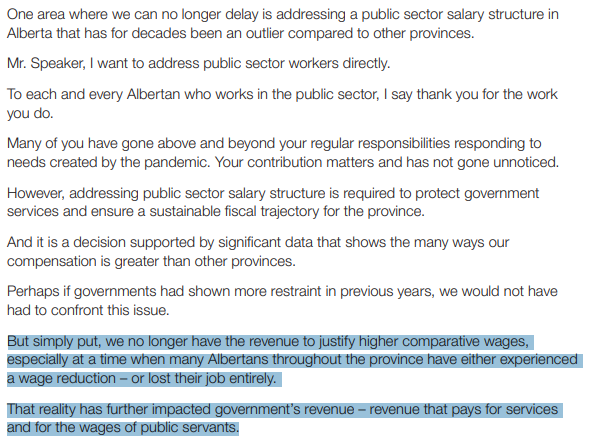
It's unfortunate to see the UCP government continue to drive a wedge between public & private-sector workers. It's a timeworn tactic in Alberta & a hallmark of right-wing parties across the globe. But it comes at a particularly bad time for our province. (Thread) 

Folks like Barbara have seen this show before. But, like her, many of us sense a difference this time around. The depth, speed, and tenor of the cuts make them seem more malicious than necessary.
https://twitter.com/BarbLarochelle/status/1364784885731266567?s=20
This goes beyond perception. The Premier has made his thoughts about public servants quite clear. In this video (see 3:05 mark), he hints it's time for public servants to feel the same pain that private-sector workers have. ctvnews.ca/video?clipId=1…
These sentiments are echoed among many movement conservatives who view the world through the lens of competition....
https://twitter.com/DrJaredWesley/status/1321089861609091072?s=20
...as others have pointed out.
https://twitter.com/maxfawcett/status/1339963902675841024?s=20
This competitive mindset manifests itself in a dog-eat-dog approach to public-sector bargaining. This may well lead to darker days of labour unrest in the months ahead. Particularly as Budget 2021 projects ~4% reduction in public sector compensation.
https://twitter.com/DrJaredWesley/status/1351582145265819648?s=20
Here, the Premier and the UCP seem to be out on a limb. Few other governments are pursuing an austerity agenda with as much vigour and steadfastness during the pandemic.
https://twitter.com/DrJaredWesley/status/1244027871053529088?s=20
This commitment is as odd as it is consistent, given the Premier's own deep background in the public sector.
https://twitter.com/DrJaredWesley/status/1331462159558082560?s=20
Cuts to the public sector are one thing. Attacks on public servants are another. Morale declines. And at a time when we need a dedicated, talented public service more than ever, we're seeing its ranks deplete. As they have elsewhere. patimes.org/the-myth-of-th…
These slights come at the end of a long year for many public servants. Hiring and wage freezes predate the Kenney government. And the pandemic has seen many working above and beyond their contracts. To then be threatened with wage roll-backs or worse?
https://twitter.com/DrJaredWesley/status/1330285490684260352?s=20
This is being done under the pretext that public-sector workers are out of touch with the needs, desires, challenges, and dreams of people in the private sector. (An odd assertion, given the UCP's own challenges on that front.)
https://twitter.com/DrJaredWesley/status/1346678634094841857?s=20
Suggesting that public servants cannot empathize with private-sector workers ignores some pretty basic facts. Most families & neighbourhoods feature members from both sides of that artificial divide. All of us feel it when there's an economic downturn.
https://twitter.com/DrJaredWesley/status/1331400509459099648?s=20
More than that, many public servants have been on the frontlines of the economic recovery fight...
https://twitter.com/DrJaredWesley/status/1330301192912707586?s=20
...as well as the struggle to ensure Alberta's most vulnerable are shielded from the worst effects of the pandemic and economic crisis.
https://twitter.com/DrJaredWesley/status/1331638032412200960?s=20
Deep public-sector cuts will only hinder attempts to spur recovery and stall increased inequality. Maligning public servants while doing it? Or suggesting they are an unnecessary *drain* on the economy or treasury? Even less productive. (image below from today's budget speech) 

Alberta's economic recovery will require a strong public sector. Public servants & researchers are needed to develop and implement policies to stimulate growth. Child care workers are desperately needed to ensure parents - predominantly women - are able to return to work.
Universities and colleges are needed to train and retrain skilled workers to drive an increasingly diversified economy. There are dozens of other reasons why investing strategically in the public sector makes more sense than ever.
More than this, public sector organizations & workers contribute to the treasury & invest in the provincial economy. Just ask businesses in downtown Edmonton or around any university or college. Reducing the purchasing power of these folks will hamper our collective recovery.
And this is not simply an urban phenomenon. In many ways, cuts affect rural communities more deeply. The impending closure of regional post-secondary programs will have major effects on these communities.
https://twitter.com/rmauthe/status/1331707358687363072?s=20
Indeed, the differences of opinion between rural & urban Albertans are less pronounced than you might think. The divide is, in many ways, part of our mythology.
https://twitter.com/DrJaredWesley/status/1328882934242185217?s=20
As integral as public servants are to our provincial economy & society, they remain outsiders -- if not antagonists -- in the stories we tell ourselves about what it means "to be Albertan." That's what makes them such easy targets.
https://twitter.com/DrJaredWesley/status/1331402446552190977?s=20
We also cannot ignore the disproportionate impacts of public sector cuts on women, members of BIPOC communities, people with disabilities, and other traditionally-marginalized groups. This is not simply because they are more likely to benefit from public programs and services.
The public sector, itself, consists of more women than men. And many public-sector organizations have been making great strides in improving equity, diversity, and inclusion. Cuts will stall or reverse any gains.
https://twitter.com/DrJaredWesley/status/1330313350052450311?s=20
Most observers agree that public-sector cuts are a necessary component -- even the most important or primary component -- of getting Alberta's fiscal house in order.
https://twitter.com/RonKneebone/status/1365019207524515841?s=20
Outside the UCP and Wildrose bubbles, however, few see the need to add insult to injury by maligning public servants. Or the value in further dividing Albertans at a time when unity is so important to our collective future.
• • •
Missing some Tweet in this thread? You can try to
force a refresh







